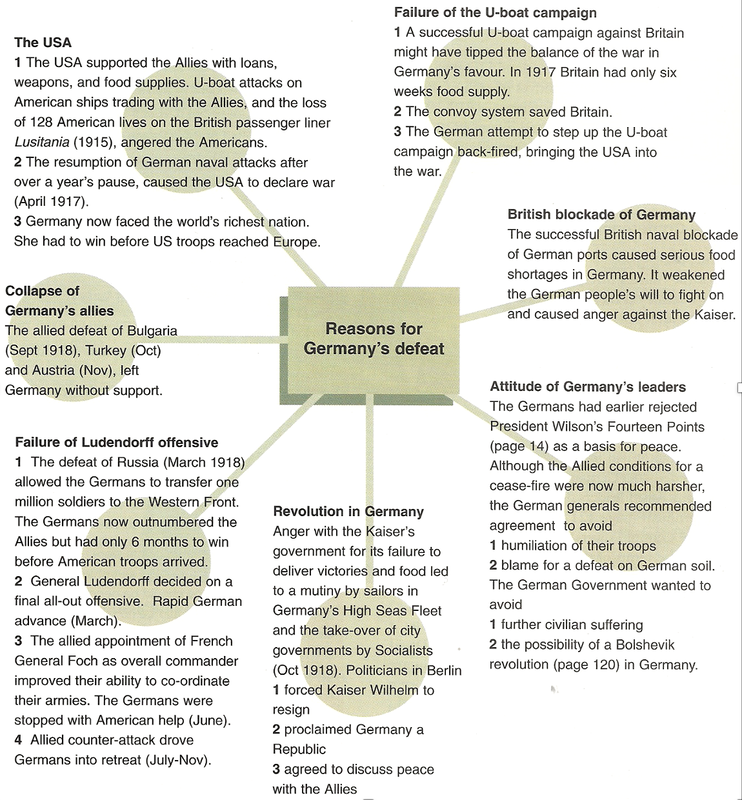|
Lesson 8 - Why was Germany defeated?
Understanding the reasons for Germany's defeat in World War I is relatively straightforward as the film from France 24 makes clear. Germany took a calculated risk of following a policy of unrestricted submarine warfare which was designed to force Britain and France to capitulate but made it likely that the USA would intervene. After the withdrawal of Russia in early 1918 (Treaty of Brest-Litovsk) , Germany threw all her remaining resources into one last push in an attempt to win before the USA involvement could be decisive. The gamble almost succeeded but ultimately failed. From the summer of 1918 it was just a matter of time before Germany was defeated. The end of the fighting was agreed at an armistice signed on November 11, 1918. The frontline of the fighting was still outside German territory. |
|
The First World War - Ian Cawood and David McKinnon-Bell
Chapter 8 – Victory and defeat (pp.139-143)
The defeat of Germany and her allies was not inevitable until August 1918, but following the early failure of the Schlieffen Plan, it was always the most likely outcome... In the early days of the conflict, Germany possessed the advantages of greater preparedness (although even she was not really ready for 'Total War') and superior quality of arms and soldiery. These advantages were however only good for the short term, and the Schlieffen Plan indicates that the more thoughtful military minds in pre-war Germany appreciated the importance of a quick victory. Once the Schlieffen Plan had failed and the initial offensives of 1914 had ground to a halt, Germany's isolation and her inability to guarantee supplies of crucial raw materials and food hamstrung her war effort.
All the long-term advantages were possessed by Great Britain: the world's most powerful navy, her extensive overseas empire, enormous financial power and (vitally) open trade routes to Japan, the USA and the Commonwealth. The problem for Great Britain was that she was wholly unready in 1914 for 'Total War', in material, ideological and psychological terms. Britain's early contributions to the Entente's war effort were unimpressive - she never had more than 1 million men under arms at any one time-and indeed the French and Russians were quick to notice this. British lassitude was a common theme of French and Russian complaints during 1915. It was 1916 before the introduction of conscription and the establishment of Lloyd George's coalition government enabled Britain to begin to mobilise her superior resources effectively, and more or less throughout the war Germany managed to squeeze more out of her economy and society than Britain did, although it may be argued that the lengths to which the German regime went to achieve this partly explain the war-weariness and discontent within Germany which culminated in revolution in 1918.
Recently, historians have turned the spotlight away from merely military explanations of the outcome of the war towards a more integrated analysis of the inter-relationship between civil society and the military. The eventual triumph of the Western Allies is now explained in terms of their greater success in balancing the needs of these two sectors... The military-dominated government of Germany failed to resolve its economic and military needs because of a failure to appreciate the importance of meeting the needs of its people alongside those of its military. As Winter argues, 'the waging of war, in economic matters as much as in other spheres, is essentially a political matter'.
Contrast this with developments in the Western democracies. In both countries, power was wrested away from the generals and enshrined in coalition governments headed by populist civilian politicians, Lloyd George and Clemenceau. The British regime promised democratic reform at the end of the struggle. The French anyway were fighting to liberate their homeland from the occupying Germans and, for all their exhaustion and disaffection; they would not rest until they had done so. …Therefore, when Britain and France asked for one last effort in 1918, they got it, unlike the German government later the same year. In the crisis of the war, democratic regimes proved more capable of demanding further sacrifices than autocratic ones. This may seem paradoxical, but as Home notes, 'mass involvement . . . the consent of the ruled' is 'an increasingly vital condition of the state's effective operation'.
To conclude, the military defeat suffered by Germany is only partly explicable in military terms. The German army performed remarkably well during the First World War, but the sheer size of the demands placed upon German society and the economy in order to meet the challenge of total war were ultimately too great to be overcome. This was true almost from the very beginning of the conflict, and it was only the extraordinary efforts of the German people and soldiery that staved off the inevitable for four years and brought their nation to what appeared to be the brink of victory during 1917. However, by this stage Germany was exhausted and, whereas Britain and France had access to overseas sources of grain and materiel, Germany, bankrupt and blockaded, was unable to draw upon such a reserve. American intervention merely reinforced this situation and hastened the end...
|
Activity
Read your textbook pages 31-32.
|
Extension
|
|
|
|

